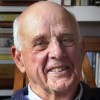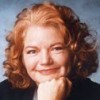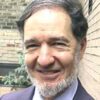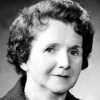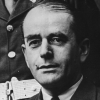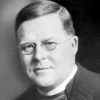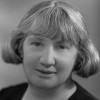We Americans are not usually thought to be a submissive people, but of course we are. Why else would we allow our country to be destroyed? Why else would we be rewarding its destroyers? Why else would we all — by proxies we have given to greedy corporations and corrupt politicians — be participating in its destruction? Most of us are still too sane to piss in our own cistern, but we allow others to do so and we reward them for it. We reward them so well, in fact, that those who piss in our cistern are wealthier than the rest of us.
Wendell Berry (b. 1934) American farmer, educator, poet, conservationist
Essay (1970-01-01), “Compromise, Hell!” Orion Magazine
(Source)
Quotations about:
environment
Note not all quotations have been tagged, so Search may find additional quotes on this topic.
Violence, in short, is the norm of our economic life and our national security. The line that connects the bombing of a civilian population to the mountain “removed” by strip mining to the gullied and poisoned field to the clear-cut watershed to the tortured prisoner seems to run pretty straight.
Wendell Berry (b. 1934) American farmer, educator, poet, conservationist
Speech (2005-05-14), Commencement, Lindsey Wilson College, Columbia, Kentucky
(Source)
This was either excerpted from, or included in, his undated essay "Letter to Daniel Kemmis," collected in The Way of Ignorance and Other Essays, Part 2 (2005).
Whether we and our politicians know it or not, Nature is party to all our deals and decisions, and she has more votes, a longer memory, and a sterner sense of justice than we do.
Wendell Berry (b. 1934) American farmer, educator, poet, conservationist
Endorsement blurb for Charles E. Little, The Dying of the Trees (1997)
(Source)
But there is another form that life can take. We can learn about it from exceptional people of our own culture, and from other cultures less destructive than ours. I am speaking of the life of a man who knows that the world is not given by his fathers, but borrowed from his children; who has undertaken to cherish it and do it no damage, not because he is duty-bound, but because he loves the world and loves his children; whose work serves the earth he lives on and from and with, and is therefore pleasurable and meaningful and unending; whose rewards are not deferred until “retirement,” but arrive daily and seasonally out of the details of the life of his place; whose goal is the continuance of the life of the world, which for a while animates and contains him, and which he knows he can never encompass with his understanding or desire.
Wendell Berry (b. 1934) American farmer, educator, poet, conservationist
The Unforeseen Wilderness: An Essay on Kentucky’s Red River Gorge, ch. 2 “The One-Inch Journey” (1971)
(Source)
In the quotation above is embedded "the world is not given by his fathers, but borrowed from his children," which appears to be the modern origin of a wide array of quotations to that effect.
The chapter was reprinted as "The One-Inch Journey" in Audubon magazine (1971-05).
The basic phrase and variants first achieved popularity in the early 1970s, showing up in a variety of forms (and often attributed to J. J. Audubon himself). Among those variants:Those variants, and more discussion about the origins of this quotation, can be found at: Quote Origin: We Do Not Inherit the Earth from Our Ancestors; We Borrow It from Our Children – Quote Investigator®.
- We have not inherited the land from our fathers, we have borrowed it from our children.
- We have not inherited the earth from our fathers and are hence entitled to use it according to our wishes. We have rather borrowed it from our children ...
- The world is not given by his fathers but borrowed from his children.
- We don’t inherit the earth from our fathers, we borrow it from our children.
- We have not inherited the earth from our fathers, we are borrowing it from our children.
- We have not inherited the earth from our parents, we have borrowed it from our children.
- We have not inherited the land from our parents, we are borrowing it from our children.
- We do not inherit the Earth from our ancestors, we borrow it from our children.
- We did not inherit the earth from our ancestors; we borrowed it from our descendants.
- We did not inherit our future from our ancestors, we have borrowed it from our children..
Note that in the 1991 edition, the passage in question is omitted in the re-edit:But there is another form that life can take. We can learn about it from exceptional people of our own culture, and from other cultures less destructive than ours. I am speaking of the lives of people who have undertaken to cherish the world and do it no damage, not because they are duty-bound, but because they love the world and love their children; whose work serves the earth they live on and from and with, and is therefore pleasurable and meaningful and unending; whose rewards are not deferred until “retirement,” but arrive daily and seasonally out of the details of the life of their place; whose goal is the continuance of the life of the world, which for a while animates and contains them, and which they know they can never encompass with their understanding or desire.
The only thing that smells worse than an oil refinery is a feedlot. Texas has a lot of both.
Molly Ivins (1944-2007) American writer, political columnist [Mary Tyler Ivins]
Essay (1972), “Texas Observed,” Place
(Source)
Collected in Molly Ivins Can't Say That, Can She? (1991).
A man may git a big fut, or a pug noze, bi birthright, but nine-tenths ov hiz virtews are the effekt ov associashun or edukashun.
[A man may git a big foot, or a pug nose, by birthright, but nine-tenths of his virtues are the effect of association or education.]
Josh Billings (1818-1885) American humorist, aphorist [pseud. of Henry Wheeler Shaw]
Everybody’s Friend, Or; Josh Billing’s Encyclopedia and Proverbial Philosophy of Wit and Humor, ch. 156 “Affurisms: Embers on the Harth” (1874)
(Source)
If the soul is left in darkness, sins will be committed. The guilty one is not he who commits the sin, but he who causes the darkness.
[Cette âme est pleine d’ombre, le péché s’y commet. Le coupable n’est pas celui qui y fait le péché, mais celui qui y a fait l’ombre.]Victor Hugo (1802-1885) French writer
Les Misérables, Part 1 “Fantine,” Book 1 “An Upright Man,” ch. 4 (1.1.4) [Bishop Myriel] (1862) [tr. Wilbour (1862)]
(Source)
(Source (French)). Alternate translations:This soul is full of darkness, and sin is committed, but the guilty person is not the man who commits the sin, but he who produces the darkness.
[tr. Wraxall (1862)]This soul is full of shadow; sin is therein committed. The guilty one is not the person who has committed the sin, but the person who has created the shadow.
[tr. Hapgood (1887)]The soul in darkness sins, but the real sinner is he who caused the darkness.
[tr. Denny (1976)]If the soul is left in darkness, sins will be committed. The guilty one is not he who commits the sin, but the one who causes the darkness.
[tr. Wilbour/Fahnestock/MacAfee (1987)]In any benighted soul -- that's where sin will be committed. It's not he who commits the sin that's to blame, but he who causes the darkness to prevail.
[tr. Donougher (2013)]
Everything on this earth iz bought and sold, except air and water, and they would be if a kind Creator had not made the supply too grate for the demand.
[Everything on this earth is bought and sold, except air and water, and they would be if a kind Creator had not made the supply too great for the demand.]Josh Billings (1818-1885) American humorist, aphorist [pseud. of Henry Wheeler Shaw]
Everybody’s Friend, Or; Josh Billing’s Encyclopedia and Proverbial Philosophy of Wit and Humor, ch. 150 “Affurisms: Parboils” (1874)
(Source)
Though it might be nice to imagine there once was a time when man lived in harmony with nature, it’s not clear that he ever really did.
Elizabeth Kolbert (b. 1961) American journalist and author
The Sixth Extinction: An Unnatural History, ch. 11 (2014)
(Source)
There are many people who want (or think they want) silence, solitude, and unspoiled nature just enough to push into and destroy all three. They will push as far as, but no farther than, good roads will take them.
Joseph Wood Krutch (1893-1970) American educator, writer, critic, naturalist
Baja California and the Geography of Hope, “Introduction” (1967)
(Source)
Because we are the cause of our environmental problems, we are the ones in control of them, and we can choose or not choose to stop causing them and start solving them. The future is up for grabs, lying in our own hands. We don’t need new technologies to solve our problems; while new technologies can make some contribution, for the most part we “just” need the political will to apply solutions already available.
Jared Diamond (b. 1937) American geographer, historian, ornithologist, author
Collapse: How Societies Choose to Fail or Succeed, Part 4, ch. 16 (2005)
(Source)
People often ask, “What is the single most important environmental / population problem facing the world today?” A flip answer would be, “The single most important problem is our misguided focus on identifying the single most important problem!”
Jared Diamond (b. 1937) American geographer, historian, ornithologist, author
Collapse: How Societies Choose to Fail or Succeed (2005)
(Source)
Over increasingly large areas of the United States, spring now comes unheralded by the return of the birds, and the early mornings are strangely silent where once they were filled with the beauty of bird song.
Rachel Carson (1907-1964) American marine biologist, author, conservationist
Silent Spring, ch. 8 “And No Birds Sing” (1962)
(Source)
This passage served as inspiration for the book title.
I did not hate them: I was indifferent to them. My crime was far worse because I was not an anti-Semite. … My conscience was progressively calloused and blunted. Of course, one’s conscience does not just cease to exist overnight; it is slowly eroded over the years, eaten away day by day, anesthetized by a multiplicity of little crimes. … As the Nazi environment enveloped us, its evils grew invisible — because we were part of them.
Albert Speer 1905-1981) German architect, government official, author, war criminal
Interview by Eric Norden, Playboy (Jun 1971)
(Source)
We shape our buildings, and afterwards our buildings shape us.
Winston Churchill (1874-1965) British statesman and author
Speech, House of Commons (28 Oct 1943)
(Source)
During the debate over rebuilding the House of Commons, which had been destroyed during a German bombing.
Never give children a chance of imagining that anything exists in isolation. Make it plain from the very beginning that all living is relationship. Show them relationships in the woods, in the fields, in the ponds and streams, in the village and in the country around it. Rub it in.
The ecological teaching of the Bible is simply inescapable: God made the world because He wanted it made. He thinks the world is good, and He loves it. It is His world; He has never relinquished title to it. And He has never revoked the conditions, bearing on His gift to us of the use of it, that oblige us to take excellent care of it.
Wendell Berry (b. 1934) American farmer, educator, poet, conservationist
Essay (1988), “God and Country,” What Are People For? (1990)
(Source)
All progress is based upon a universal innate desire on the part of every organism to live beyond its income.
Samuel Butler (1835-1902) English novelist, satirist, scholar
The Note-Books of Samuel Butler, ch. 1 “Life” (1912)
(Source)

